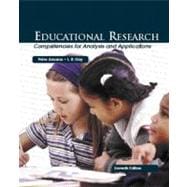Summary
This market-leading book offers all the skills and procedures readers need to become competent consumers and producers of educational research. It uses a direct, step-by-step approach to the topic, while placing a strong emphasis on evaluation of reader performance. The accessible writing style and light, humorous tone demystify this demanding course. This comprehensive instructional resource encompasses the full spectrum of the field, making it appropriate as a core book for an introductory course in educational research. Includes expanded coverage of qualitative methods and learning to read and evaluate research effectively. Helps readers develop a complete quantitative research study, a qualitative research design, and an action research design. For professionals in the field of educational research.
Table of Contents
PART ONE: RESEARCH FOUNDATIONS.
1. Intro to Educational Research.
2. Selection and Definition of a Problem.
3. Preparation and Evaluation of a Research Plan.
4. Selection of a Sample.
5. Selection of Measuring Instruments.
PART TWO: QUALITATIVE RESEARCH.
6. Characteristics of Qualitative Research.
7. Qualitative Data Collection.
8. Qualitative Data Analysis.
9. Action Research.
PART THREE: QUANTITATIVE RESEARCH.
10. Survey Research.
11. Correlational Research.
12. Causal-Comparative Research.
13. Experimental Research.
14. Descriptive Statistics.
15. Inferential Statistics.
16. Postanalysis Considerations.
PART FOUR: PRODUCING AND CONSUMING RESEARCH.
17. Preparation of a Research Report.
18. Evaluation of a Research Report.
Excerpts
PHILOSOPHY AND PURPOSE This text is designed primarily for use in the introductory course in educational research that is a basic requirement for many graduate programs. Since the topic coverage of the text is relatively comprehensive, it also may be easily adapted for use in either a senior-level undergraduate course or a more advanced graduate-level course. The philosophy that guided the development of the current and previous editions of this text was the conviction that an introductory research course should be more skill and application oriented than theory oriented. Thus the purpose of this text is to have students become familiar with research mainly at a "how to" skill and application level. The text does not mystify students with theoretical and statistical jargon. It strives to provide a down-to-earth approach that helps students acquire the skills and knowledge required of a competent consumer and producer of educational research. The emphasis is not just on what the student knows but also on what the student can do with what he or she knows. It is recognized that being a "good" researcher involves more than the acquisition of skills and knowledge; in any field, significant research is usually produced by persons who through experience have acquired insights, intuitions, and strategies related to the research process. Research of any worth, however, is rarely conducted in the absence of basic research skills and knowledge. A basic assumption of this text is that there is considerable overlap in the competencies required of a competent consumer of research and a competent producer of research, and that a person is in a much better position to evaluate the work of others after she or he has performed the major tasks involved in the research process. ORGANIZATION AND STRATEGY The overall strategy of the text is to promote students' attainment of a degree of expertise in research through the acquisition of knowledge and by involvement in actual research. ORGANIZATION Part One discusses the scientific and disciplined inquiry approach and its application in education. It describes the main steps in the research process and the purpose and methods of the various approaches to research. In Part One, each student selects and delineates a research problem of interest that has relevance to his or her professional area. Throughout the rest of the text, the student then simulates the procedures that would be followed in conducting a study designed to investigate the problem; each chapter develops a specific skill or set of skills required for the execution of such a research study. Specifically, the student reviews and analyzes related literature and formulates hypotheses (Chapter 2), develops a research plan (Chapter 3), selects and defines samples (Chapter 4), and evaluates and selects measuring instruments (Chapter 5). Part Two describes qualitative research, including the different approaches to and the collection and analysis of qualitative data. Part Three describes and discusses quantitative research, data collection and analysis, including statistics. In Part Four the student applies the skills and knowledge acquired in Parts One through Three and evaluates a research report. STRATEGY This text represents more than just a textbook to be incorporated into a course; it is actually a total instructional system that includes stated objectives, or competencies, instruction, and procedures for evaluating each competency. The instructional strategy of the system emphasizes demonstration of skills and individualization within structure. The format for each chapter is essentially the same. Following a brief introduction, each task to be performed is described. Tasks require students to demonstrate that they can perform particular research functions. Since each student works with a different problem, each student demonstrates the competency required by a task as it applies


